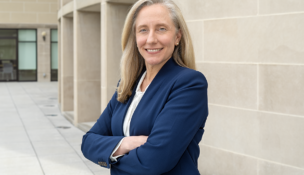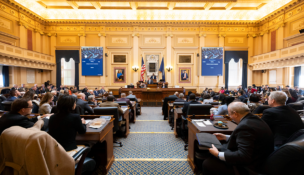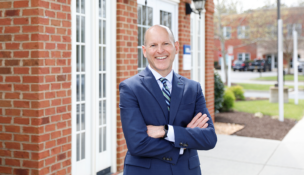McAuliffe’s blunder is post-debate topic
Tim Thornton //July 20, 2013//
Political debates are often about zingers and blunders.
Terry McAuliffe’s attempt at the first turned out to be the second.
During Saturday’s Virginia Bar Association Gubernatorial Debate, McAuliffe, the Democratic candidate, said that an investigation into Republican candidate Attorney General Ken Cuccinelli’s dealings with Star Scientific and company owner Jonnie Williams showed the attorney general should have been prosecuted, if Virginia’s rules about disclosure were stronger. The report by Richmond Commonwealth’s Attorney Michael N. Herring, which was requested by the attorney general, doesn’t say that.
After the debate, McAuliffe tried to walk back his statement.
“The way I interpreted it is he could have been prosecuted if we had stronger disclosure laws in Virginia,” McAuliffe told reporters after the debate. “He could have been prosecuted … That’s our analysis of the report.”
In fact, the report says the laws Cuccinelli may have come closest to violating – prohibitions on officials receiving gifts when the timing or frequency could raise suspicion– do “not carry criminal penalties.”
Cuccinelli received many expensive gifts from Williams, not all of them recorded on his disclosure reports, but that’s not grounds for prosecution, according to the report.
Herring, a Democrat, concluded “one cannot help but question” whether repeated omissions of gifts from disclosure forms are “coincidence or a pattern reflecting intent to conceal.” But Herring decided disclosure of other gifts and benefits Cuccinelli received from Williams suggest he wasn’t trying to conceal his relationship with Williams. Herring also decided that Cuccinelli’s owning and trading in Star Scientific stock while the company was engaged in a court case with the commonwealth wasn’t grounds for prosecution, either.
Parsing McAuliffe’s blunder and his muddled attempt to clarify it captivated the press corps, but the candidates did talk about and around other issues, many of them tied to the economy.
When moderator Judy Woodruff, co-host of the PBS NewsHour, asked which programs they would cut and which taxes they would raise if they were governor, each candidate gave evasive answers. Cuccinelli said he would appoint a commission to examine tax breaks and loopholes and tie government spending to population and inflation, something he called “a massive undertaking.” McAuliffe said he would go after the same set of loopholes, but he expects Virginia to get substantial savings from the expansion of Medicare that will allow money going to health care to be redirected to transportation and education. Cucinnelli called that “pure flim-fammery.”
Both candidates took a stand on divisive social issues. McAuliffe said he would sign a bill recognizing gay marriage if one reached his desk. Cuccinelli said the same about a bill declaring that life begins at conception.
McAuliffe returned repeatedly to Cuccinelli’s socially conservative record, relating it to the economy. To be successful, McAuliffe said, Virginia has to be welcoming. Alluding to Cuccinelli’s challenge of then University of Virginia professor Michael Mann’s climate change research, the attorney general’s history of opposing abortion and what Cuccinelli called “the personal challenge of homosexuality,” McAuliffe said it’s difficult to get the best scientists to come to Virginia when state government is challenging their work and it’s difficult to get women and gays to want to work in Virginia when their rights are being attacked. Cuccinelli said the notion that his positions chase businesses out of Virginia would be laughable if the matter weren’t so serious. “This isn’t debating,” Cucccinelli said. “This is demonization.” McAuliffee is the one driving jobs from Virginia, Cuccinelli charged, by sending Green Tech, an electric car company of which McAuliffe was chairman, to Mississippi instead of bringing the company and the jobs it was supposed to create to Virginia.
Asked whether increased taxes and decreased entitlement benefits should be part of a federal deal that would replace the sequester, Cuccinelli said everything needs to be considered. McAuliffe talked about the importance of diversifying Virginia’s economy.
When Woodruff asked the candidates about immigration reform, Cuccinelli said there should be a compromise, but he would not take a position on whether it should include a path to citizenship for undocumented immigrants. McAuliffe endorsed compromise, a path to citizenship and said he would be proud to sign a Virginia version of the Dream Act, which would give benefits to people who came to the United States illegally as children.
McAuliffe characterized the election as “a choice between rigid ideology and mainstream compromise.” Cuccinelli, citing his years of public service, said Virginians have a right to ask that their governor has made some commitment to Virginia before running for governor.
Perhaps the only thing Cuccinelli and McAuliffe agreed on during the debate is that Virginia’s next governor should focus on jobs, the economy and transportation. They don’t agree about what to do once they’ve focused.
The debate came at the end of a week that saw three polls provide different snapshots of the race. Public Policy Polling (PPP) and a Quinnipiac University poll showed McAuliffe with a four-point lead. A Roanoke College poll showed Cuccinelli with a five-point lead. All three polls showed Cuccinelli with a similar percentage of Virginia voters on his side — 39, 37 and 34 percent – but the Roanoke College poll found significantly fewer McAuliffe supporters. Quinnipiac gave McAuliffe 43 percent of the respondents, PPP showed him with 41 percent. Only 29 percent of the respondents to the Roanoke College poll supported McAuliffe.
The Virginia Bar Association, which held the debate as part of the organization’s 123rd summer meeting, has hosted gubernatorial debates since 1985.
Photos by Mark Rhodes
P

















